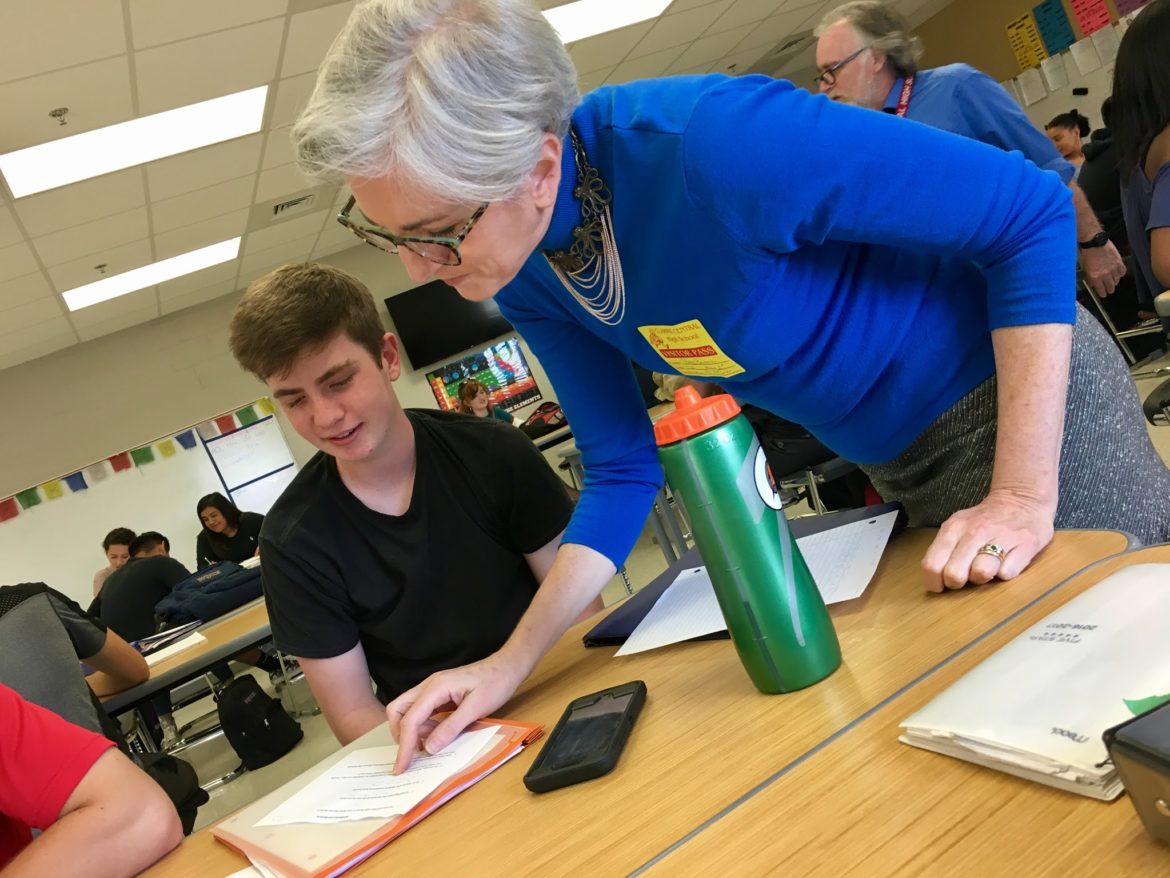Dr. Peggy Brickman, a professor for the department of plant biology at the University of Georgia and a Clarke Central High School parent, helps her son, CCHS sophomore Charles Dawe, fill out a worksheet on Jan. 18. Brickman visited the seventh period Advanced Placement Environmental Science class at CCHS to discuss the upcoming Prevalence of Antibiotic Resistance Bacteria in the Environment (PARE) project in hopes of forming have a high school and college partnership. “Partnerships are formed between college undergraduate classrooms and high school science classes to bridge social and professional connections for both students and faculty,” Brickman said. “And I think this project can do just that.” Photo by Andrew Caldwell.
By ANDREW CALDWELL – Junior copy Editor
University of Georgia professor Dr. Peggy Brickman visited the seventh period Advanced Placement Environmental Science class at Clarke Central High School to discuss an upcoming collaborative project on Jan. 17 and 18.
Last year alone, 23,000 Americans died from bacterial infections.
Dr. Peggy Brickman, a professor for the department of plant biology at the University of Georgia announced this to the seventh period Advanced Placement Environmental Science class at Clarke Central High School on Jan. 17 and Jan. 18.
“That’s what you guys will be helping us with throughout this project. This group at Tufts University, their medical school is interested in finding out how many people might be exposed to antibiotic resistance bacteria from the environment,” Brickman said.
Students will be participating in the Prevalence of Antibiotic Resistance Bacteria in the Environment (PARE) project, a process whose goal is to provide a pathway for instructors to implement research into their classrooms, according to Brickman.
“(The students) are gonna help us by studying soil. They want detailed surveillance of where antibiotic bacteria are, and they will compare that with what the infection rates look like in the local populations,” Brickman said. “Students all across the country involved in PARE have been collecting soil samples to try and figure out where these bacteria are more commonly found. My undergrads are gonna help me process the student’s soil samples and then they’re gonna bring them back here to the CCHS campus and help the students enter them into the database on our website.”
Students were grouped into threes or fours and have been assigned to go out into the Athens community to collect soil samples for this scientific study. According to science department teacher Claude Gonzalez, not only is this a scientific opportunity, but a cooperative one as well.
“Students collect soil samples and use classic microbiological laboratory techniques to determine the relative number of bacteria resistant to antibiotics. Once students have the GPS (global positioning system) coordinates of the soil sampling sites and have entered it into the database, we will be able to see how our soil compares to other cities,” Gonzalez said. “I wanted this to be as collaborative as possible for the benefit of my students.”
For senior Alondra Diaz, her participation in PARE is more than a graded assignment.
“As a senior, I’m actually really psyched about working this closely with college professors and students,” Diaz said. “The fact that we are given opportunities to not just stick to a textbook and listen to lectures all the time is really exciting for me.”
